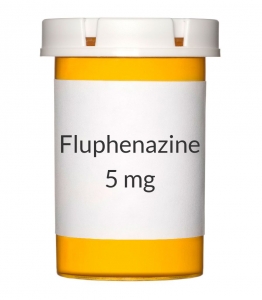Fluphenazine is an antipsychotic drug used to treat different mental health disorders that cause nervousness and disruptive thoughts. It is available with the brand name Prolixin, and it comes as a tablet to be taken orally.
Fluphenazine balances the dopamine levels in your brain; dopamine helps regulate mood, thoughts, and behaviour. Some of the conditions that can be treated with fluphenazine include psychosis, mania, dementia, schizophrenia, and bipolar disorder.
Dosage
This medicine is used to treat a variety of conditions, so your doctor will assess your condition and note your age before giving you a prescription; the drug is usually taken by mouth 2 to 4 times daily.
The dosage may be increased according to your response to treatment; however, do not increase or stop taking the drug without consulting a doctor. It may take up to 2 weeks to see the effect of this drug, so let your doctor know if your condition doesn’t improve.
Fluphenazine is not recommended for children below 12 years old.
Side Effects of Fluphenazine
The signs of an allergic reaction to this drug include hives, sore throat, difficulty breathing, skin pain, swelling in your throat or face, blistering or peeling, and purple or red skin. Get emergency medical attention if you notice any of these signs.
The common side effects of fluphenazine include:
- Painful or difficult urination.
- Uncontrolled muscle movement in the face.
- Blurred vision, eye pain, tunnel vision, or seeing halos around lights.
- Jaundice.
- Extreme lightheadedness or drowsiness.
- Severe stomach pain, constipation or bloating.
- Strange dreams, restlessness or excitement.
- Seizure.
- Increased urination and sweating.
- Breathing problems.
- Low white blood cell count with symptoms like mouth sores, fever, sore throat, chills, cough, and skin sores.
- Headache or drowsiness.
- Stuffy nose, drooling, or dry mouth.
- Nausea and loss of appetite.
- Impotence and trouble having an orgasm.
- Swelling and weight changes.
- Muscle movement and problems with balance.
- Breast swelling and tenderness.
Precautions
Do not use this medication if you are allergic to fluphenazine or phenothiazines.
Before using this drug, let your doctor know if you have a medical history of any brain or mental illness, food or drug allergies, respiratory problems, liver disease, alcohol addiction, glaucoma, diabetes or high blood pressure.
High doses or long-term use of this drug can lead to severe movement disorder that may become permanent. The longer you use the drug, the more likely you are to develop movement disorder.
Using antipsychotic drugs during the last trimester of pregnancy can cause feeding problems, breathing problems or withdrawal symptoms in newborns. If you get pregnant while using this medication, let your doctor know; also note that it may cause false pregnancy test results.
It is not safe to use fluphenazine when breastfeeding, so seek your doctor’s advice if you are breastfeeding or pregnant before using the drug.



